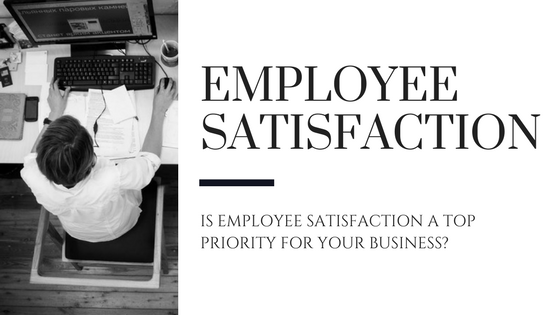Employee Satisfaction
Is employee satisfaction a top priority for your business? Do you consider this an area that can always be improved? Hopefully, you answered yes to both of these questions, as we think this area should not only have a high priority but should also never cease to be improved upon. Afterall, employees who are happy at work are 12% more productive than those who aren’t! Wouldn’t you love to see the productivity of your team go up by 12%? Imagine what more you could accomplish!
Before we get into how to make this happen for your business, first, let’s define employee satisfaction. Employee satisfaction means the extent to which an employee feels personally content in their position or workplace. There are several ways this can be accomplished, and the criteria that each employee requires to feel content will likely vary from person to person. We hope to provide you with some helpful insight into how you might increase your employees’ satisfaction. While you may feel that hard work and success should produce happy workers, often this equation proves to be reversed from the employee’s perspective.
Work environment is one of the primary factors affecting employee satisfaction. If you can’t think of what makes your business’s environment unique, it’s probably a sign that you need to start brainstorming and implementing creative initiatives into your workplace. One effective strategy is to give your employees the freedom to choose their personal workspace. Employees who control the layout and design of their workspace are not only happier but also 32% more productive. For example, your employees who have offices within your dealership should be given some freedom in decorating their space or even influencing the decor that you change up around the dealership seasonally. This gives them a creative outlet they might desire to feel “at home” while at work. Afterall, they probably spend more time in their workplace than their home!
Management approachability is another key factor that influences employee satisfaction. You’ve probably heard the old adage, “My door is always open.” Although several managers give this schpiel to their employees upon hire, not quite as many follow through on making themselves available and approachable for their employees when they need it most. By improving communication and committing to this open door policy at all times, your employees will be loyal to you, and happier at work because they can trust their manager. Depending on the number of employees you directly manage, you might even consider setting aside time weekly or biweekly to have one-on-one meetings with each employee. This allows you to keep the communication line open and honest, as well as use it as an opportunity to gauge their level of satisfaction and personal accomplishment.
Task variety might be a factor that you hadn’t previously associated with employee satisfaction. By adjusting your employees’ work days, you can significantly improve their workplace happiness and overall job satisfaction. Just because an employee excels at, or even likes a particular task, doesn’t mean they want to do that same task every day for the rest of their careers. Employees, whether they express it or not, all want to grow in their careers and this requires change in their tasks and projects and encouraging them to try things they haven’t led or accomplished before. You might receive some initial push back, since most of us are hesitant about change, however, long term, your truly successful, happy employees will relish learning and growing in their capabilities.
“Work culture” is a newer idea your business might not be familiar with. While many might attribute a strong work culture to companies like Google and Netflix with their in-office arcade games, couches and cafeterias, this is not necessarily what we mean when we define work culture. Work culture is made up of the collective attitude, values, and behavior of your employees. It is a powerful force that affects every employee, and although you cannot control it, you can strongly influence it. By paying close attention to the attitudes and values your employees hold from the hiring process to letting them go, you will make better decisions about who “fits” your business’s culture. The way your employees treat you and their peers reflects this, as well as the balance of stress with activities that alleviate stress. Examples of implementing a strong work culture could include: quarterly outings, weekly or monthly team meetings where you acknowledge specific accomplishments, or holiday events. By improving your office’s culture, and thereby your work environment, you will increase your employee satisfaction and retention as your team becomes more loyal to one another and your mission.
Take note of your work environment and employee attitudes and try putting into effect some of these ideas we’ve mentioned. You’ll be surprised the change in attitude and behavior of your employees. And, you know what they say…happy employees make for a happy boss!


